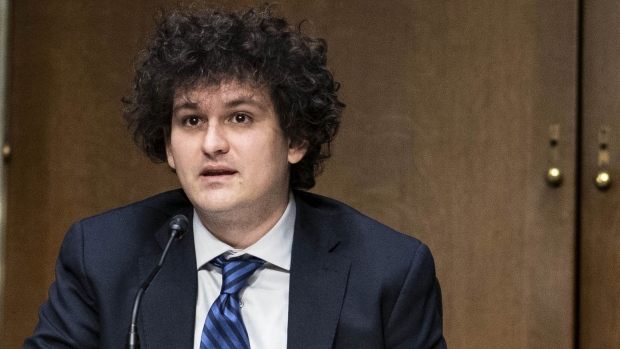Dec 13, 2022
Bankman-Fried Accused of Record US Campaign-Finance Violations
, Bloomberg News

(Bloomberg) -- Sam Bankman-Fried, the second biggest Democratic donor in the 2022 election cycle, is charged with violating campaign finance laws, in what could be the biggest infusion of illegal corporate money into US politics in decades.
The FTX founder and two other top executives at the bankrupt crypto empire have lavished $76.1 million on super-PACs and other political committees in recent years. That spending is now the subject of one of the eight criminal counts of the Justice Department’s indictment, which alleges the former billionaire conspired with other unnamed individuals to use corporate money and shadow donors starting in 2020 to contribute to political campaigns.
“This is the largest corporate conduit contribution case in US history,” said Brett Kappel, a political lawyer with Harmon Curran. He said the previous high involved the Grocery Manufacturers Association, now the Consumer Brands Association, which was fined $18 million for making $11 million in disguised corporate contributions in a Washington state referendum campaign. After a lengthy court battle, the association agreed to the fines in 2022.
The FTX collapse could pull in the dozens of Republican and Democrat candidates, super-PACS and other fundraising groups into a complicated legal proceeding, and could put them at reputational risk for holding money that may have come unwittingly from FTX’s customers accounts. The ongoing bankruptcy proceeding could also force fundraising committees to pay back the money — plus interest — just as they’re trying to bring in cash for the 2024 presidential election.
Under campaign finance laws, it’s illegal to donate corporate money to campaigns, parties and PACs. While super-PACs can accept direct donations from corporations, they have to disclose the source of the funds.
Bankman-Fried, Ryan Salame, the chief executive officer of FTX Digital Markets, and Nishad Singh, FTX’s director of engineering, have emerged as major political donors. They combined to give $70.5 million in the midterms, and Bankman-Fried previously donated $5.6 million in the 2020 election cycle.
All three received large sums of money in the form of loans made by Alameda Research, Bankman-Fried’s hedge fund, according to a November bankruptcy filing. Bankman-Fried borrowed $1 billion, Singh took $543 million and Salame got $55 million.
Bankman-Fried received numerous loans and in one case signed as both the issuer and the recipient, John J. Ray III, who is now FTX chief executive, told lawmakers at a House hearing Tuesday.
“We have no information, at this time, as to what the purpose or the use of those funds were — and that is part of our investigation,” he said.
The indictment says only that the amount of money donated exceeded $25,000, the threshold triggering fines, a prison sentence of up to five years, or both.
Manhattan US Attorney Damian Williams said Tuesday that the alleged scheme involved “dirty money” that was “used in service of Bankman-Fried’s desire to buy bipartisan influence and impact the direction of public policy in Washington.”
Bankman-Fried also is charged with wire fraud and conspiracy.
Previous schemes to use conduit contributions, an enforcement priority for the Justice Department, have tended to involve much smaller amounts — some, in part because donors used straw-man contributions to get around contribution limits to campaigns, said Craig Engle of ArentFox Schiff. Bankman-Fried and his colleagues gave about $1.8 million to committees with contribution limits, with the remainder going to super-PACs.
Since the Supreme Court’s 2010 Citizens United case and related rulings, corporations can legally donate to super-PACs. FTX US and Alameda Research also donated directly to super-PACs, combining to give $8.4 million since 2020.
“There are so many ways to do things legally,” Engle said “I’m always surprised that people resort to illegal means.”
--With assistance from Allyson Versprille and Laura Davison.
©2022 Bloomberg L.P.





